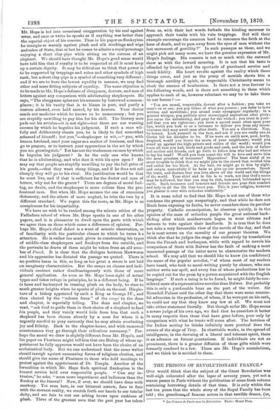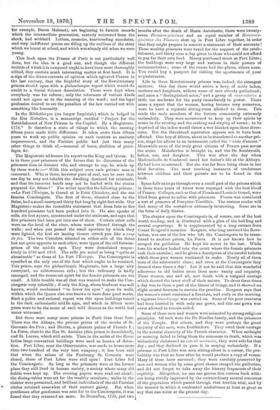THE PRISONS OF REVOLUTIONARY FRANCE.*
OE would think that the subject of the Great Revolution was well-nigh exhausted after the lapse of seventy years, yet not a season passes in Paris without the publication of some fresh volume containing harrowing details of that time. It is only within the last ten years that the whole story of the Royal Family has been told ; the grandsontof famous actors in that terrible drama, (as, * Les pri40118 de Paris SOW la Revolution. Paris: Henri Pion.
for example, Baron Malouet), are beginning to furnish records which the intermediate generation, scarcely recovered from the shock, had withheld. Letters, memoirs, heartrending anecdotes, and very indifferent poems are filling up the outlines of the story which we learnt at school, and which was already old when we were young.
This book upon the Prisons of Paris is not particularly well done, but the idea is a good one, and though the different recitals of which it is composed ought to have been more thoroughly edited, they contain much interesting matter at first hand. It is a sign of the divers currents of opinion which agitated France in the last century, that the frightful story of the Revolutionary prisons should open with a philanthropic report which would do credit to a Social Science Association. Those were days when everybody was for reform ; only the reformers of various kinds could not agree as to the meaning of the word ; and the legal profession desired to see the penalties of the law carried out with something like humanity.
In the Bibliothequie (no longer Imperiale) which is lodged in the Rue Richelieu, is a manuscript entitled "Project for the Establishment of New Prisons in the Capital. By a Magistrate. 1776." It describes a state of things to which the ensuing fifteen years made little difference. It takes more than fifteen years to work up public opinion on such matters as sanitary improvement, and the Parisian public had just then many other things to think of,—removal of taxes, abolition of privi- leges, &c.
The Nagistrate addresses his report to the King and Queen. It is to these poor prisoners of the future that he discourses of the prisoners then in durance vile, and strange to say, he winds up by these words :—" With this subject even each private man is concerned. Who is there, however pure of soul, can be sure that one day he may not inhabit the dwelling destined for criminals, and that his innocent hands may not be loaded with the chains prepared for felons?" The writer specifies the following prisons : —Le Fort rflveque, le Grand et le Petit Chatelets, and the too famous Conciergerie. The first of these, situated close to the Seine, had a small courtyard thirty feet long by eight feet wide. Our Magistrate makes the incredible statement that from four to five hundred prisoners had been packed into it. lie also speaks of cells, six feet square, constructed under the staircase, and says that five prisoners had been put into one of them. Certain other cells were on the level of the river, whose water filtered through the walls ; and when you passed the small aperture by which they were lighted, the foul air issuing thence struck you like a coup de feu. The two Chatelets, situated on either side of the Seine but not quite opposite to each other, were types of the old fortress- prison of the middle ages. They were demolished respec- tively in 1782 and 1802. The cells are noted as being "quite as abominable" as those of Le Fort l'Evaque. The Conciergerie is specified as the only one of the four which ought to be retained. This prison, says the philanthropic Magistrate, has a large airy courtyard, no subterranean cells ; but the infirmary is badly managed, and the rooms set apart for the female prisoners are too small. A little trouble was all that was wanted to make the Con- ciergerie very tolerable ; if only the King, whose kindness was well known, would condescend "to lower his eyes" upon its walls, within which the Queen also was known to have done good works. Such a polite and rational report was this upon buildings raised in the dark enthusiastic middle ages, and which in fifteen more years were to be the scene of such wild dramas as the world had never witnessed.
But there were many more prisons in Paris than these four. There was the Abbaye, the private prison of the monks of St. Germain des Prds ; and Bieetre, a pleasure palace of Francis I.; La Force, close to the Rue St. Antoine (this prison is demolished), and St. Lazare, which still exists. Then in the midst of the Revo- lution large conventual buildings were used as houses of deten- tion. Port Libre, near the Observatoire, was made to house more than two hundred of the very best company ; it has been said that when the salons of the Faubourg St. Germain were closed, those of Port Libre were still open ! Port Libre fed the Conciergerie. So long as the prisoners were at the former place they still lived in human society, a society where many old habits were kept up. The evening papers were read out aloud ; the dining-tables were set for the wealthy members ; walks in the cloister were permitted, and brilliant individuals of the old Parisian • circles retained somewhat of their ancient gaiety. But when gentleman after gentleman was sent for to the Conciergerie, it was found that they returned no more. In Deceniber, 1793, just two
months after the death of Marie Antoinette, there were twenty- seven Fermiers-generaux and an equal number of Receveurs- generaux des Finances shut up in Port Libre together, in order that they might prepare in concert a statement of their accounts ! These wealthy prisoners were taxed for the support of the estab- lishment, and thirty sous a day given to those who could not afford to pay for their own food. Money purchased much at Port Libre ; the buildings were very large and various in their powers of accommodation ; some of the rooms had fire-places, others none. You could buy a passport for visiting the apartments of your acquaintances.
Life in these Revolutionary prisons was, indeed, the strangest mixture. One day there would arrive a bevy of noble ladies, mothers and daughters, widows some of men already guillotined ; and anon a "distinguished actor," and a group of sans-culottes a trifle too moderate for the party immediately in power. There arose a report that the women, having become very numerous, were to have a separate sitting-room allotted to them. This made the male members of the forlorn community extremely melancholy. They were accustomed to keep up their spirits by music in the evening and the making and singing of verses ; to be deprived of the ladies would throw a wet blanket upon these diver- sions. But the threatened separation appears not to have been effected. One boy of fifteen, about to be transferred to another pri- son, sings his adieux to an instrument called the " viole d'amour." Meanwhile some of the truly great citizens of France pass across the scene. Malesherbes is brought in, and the De Sombreuils, father, son, and daughter. This was after the day when Mademoiselle de Sombreuil saved her father's life at the Abbaye. He had been re-arrested. But she was far from being alone in her filial devotion. The most touching instances of tenderness between children and their parents are to be found in this book.
Space fails us to go through even a small part of the prisons which in those three years of terror were regorged with the beat blood of France. Colleges, such as that of Plessis and Louis le Grand, were filled from garret to cellar with prisoners. Plessis was considered a sort of preserve of Fouquier-Tinville's. The curious reader will find many of the narratives extremely interesting. Some are in the form of daily diaries.
The chapter upon the Conciergerie is, of course, one of the best worth reading, and is illustrated with a plan of the building and several engravings. It is supplemented by a long extract from Count Beugnot's memoirs. Beugnot, who long survived the Revo- lution, was one of the few who left the Conciergerie to be trans- ferred to another prison, La Force. It is not known how he escaped the guillotine. He kept his secret to the last. While here his window looked into the court where the female prisoners took their exercise ; and he gives a description of the careful toilette which these poor women continued to make. Nearly all of them were of the aristocratic class ; and even at the Conciergerie they dressed three times a day! Let it not be said that this wonderful adherence to old habits arose from mere vanity and coquetry. These women, one and all, met death with a resigned courage which showed the inner stuff of their nature. To dress three times a day was to them a part of the fitness of things, and it showed no slight mental firmness to sustain the practice. Beugnot says that the women's court contained a fountain, and early in the morning a vigorous blanchissage was carried on. Some of the poor creatures had been hurried in with only one gown, and this one gown was never allowed to remain soiled.
Some of these men and women were animated by strong religious principles. Of such were the Be Noailles family, and the prisoners of the Temple. But others, and they were perhaps the great majority of the men, were freethinkers. They owed their courage to the natural elasticity of the French character. When midnight or morning failed to bring them the summons to death, which was whimsically christened an exti ait mortuaire, they were safe for that day ; and they declined to pass it in moping melancholy. If a prisoner at Port Libre was seen sitting silent in a corner, the pro- bability was that an hour after he would produce a copy of verses. Many of these have survived ; they were carefully preserved by men and women who by some great chance escaped the guillotine, and did not forget to take away the literary fragments of their captivity. Altogether, no one can peruse this curious book with- out being vividly impressed by the extraordinary mental resources of the geaeratioa which passed through that terrible trial, and by the manner in which it confronted misfortunes at least as great as any that can recur at the present day.



































 Previous page
Previous page